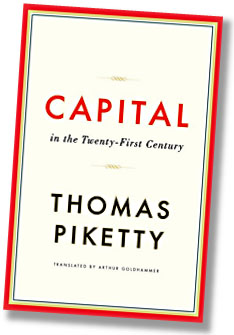 On Thursday I posted a couple of very rudimentary comments regarding Thomas Piketty’s blockbuster new book, Capital in the 21st Century. I had questions about Piketty’s estimates of r (return on capital) and g (economic growth) in the past and—much more importantly—how they were likely to play out in the future. But all I had were amateur musings because I am, after all, only an amateur.
On Thursday I posted a couple of very rudimentary comments regarding Thomas Piketty’s blockbuster new book, Capital in the 21st Century. I had questions about Piketty’s estimates of r (return on capital) and g (economic growth) in the past and—much more importantly—how they were likely to play out in the future. But all I had were amateur musings because I am, after all, only an amateur.
However, yesterday Brad DeLong tackled some of the questions I asked in a far more rigorous and disciplined way, teasing out a lot of unstated implications along the way—including the importance of various measures of r and how they relate to the probability of increasing future wealth concentration in the real world. It’s a long post, and complex in places, but highly recommended. If you’re willing to work your way through it, DeLong provides a framework for thinking about Piketty’s model that helps you start to make sense of both the book and its conclusions.
POSTSCRIPT: I’ve gotten a couple of questions about why I seem unduly skeptical, or even harsh, about Piketty’s book. It’s obviously a landmark work, I don’t really mean to be unfair. But it’s a book with innovative and untested ideas that has obvious appeal to anyone left of center, and I think this is precisely the time to avoid unquestioning hosannas. Affinity bias makes us all sympathetic to Piketty’s arguments, and that’s why we should instead question it carefully and thoroughly.













